A home water softener system typically costs between $200 and $6,000, with most homeowners spending around $1,500 including installation. You’ll find basic ion exchange systems starting at $400, while thorough whole-house solutions can reach $7,000 for professional-grade equipment. Beyond purchase price, factor in installation costs of $1,000-$3,000 and annual maintenance expenses of $50-$300. The benefits include extended appliance life, better water quality, and reduced soap usage. Understanding your specific needs and local water conditions will guide you toward the most cost-effective solution.
TLDR
- Water softeners cost between $200 to $6,000, with most homeowners paying around $1,500 including installation for a standard system.
- Installation costs typically range from $1,000 to $3,000, with professional labor adding $150 to $900 for basic setups.
- Annual maintenance costs run $50 to $300, plus monthly expenses for salt replacement ($5-15) and occasional filter changes.
- Soft water extends appliance life, reduces soap usage, and provides better skin and hair care benefits.
- Salt-based systems offer superior water softening, while salt-free alternatives provide eco-friendly options at $500 to $4,000.
Understanding Water Softener Price Ranges
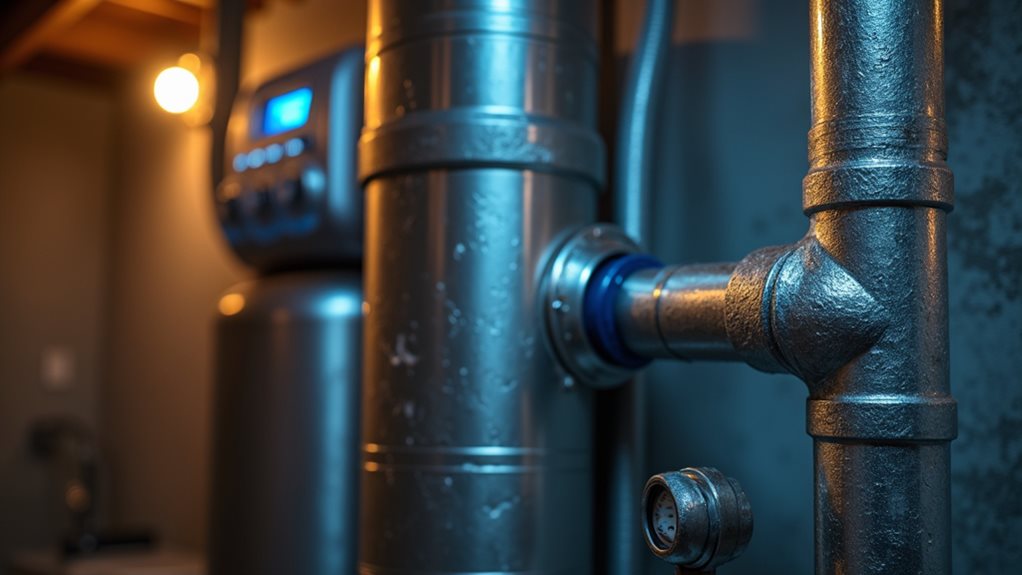
While the cost of a water softener can vary dramatically, you’ll typically find prices ranging from $200 for basic magnetic systems to upwards of $6,000 for extensive whole-house solutions. Professional-grade systems from established manufacturers often fall between $4,000 and $7,000, though you’ll find many quality options around the national average of $1,500, including standard installation costs.
Salt-based water softeners tend to be more effective at treating hard water than alternative systems, making them worth considering despite potentially higher costs. Additionally, maintenance expenses for these systems can impact the overall cost of ownership, highlighting the importance of long-term financial planning.
Key Factors That Impact Water Softener Costs
Understanding the true cost of a water softener requires examining several key factors that extend well beyond the initial purchase price.
Your home’s size and location will greatly influence costs, as larger properties need higher-capacity systems, while your area’s water hardness levels can dictate the type of system you’ll need. Additionally, hard water can cause mineral buildup, affecting seals and increasing the risk of leaks in plumbing systems.
Considering that systems can range from basic to premium, with prices spanning from $300 to $7,000, it’s crucial to choose one that matches your specific requirements.
Additionally, you’ll need to factor in installation complexity, brand quality, and ongoing maintenance requirements.
Popular Types of Water Softeners and Their Prices
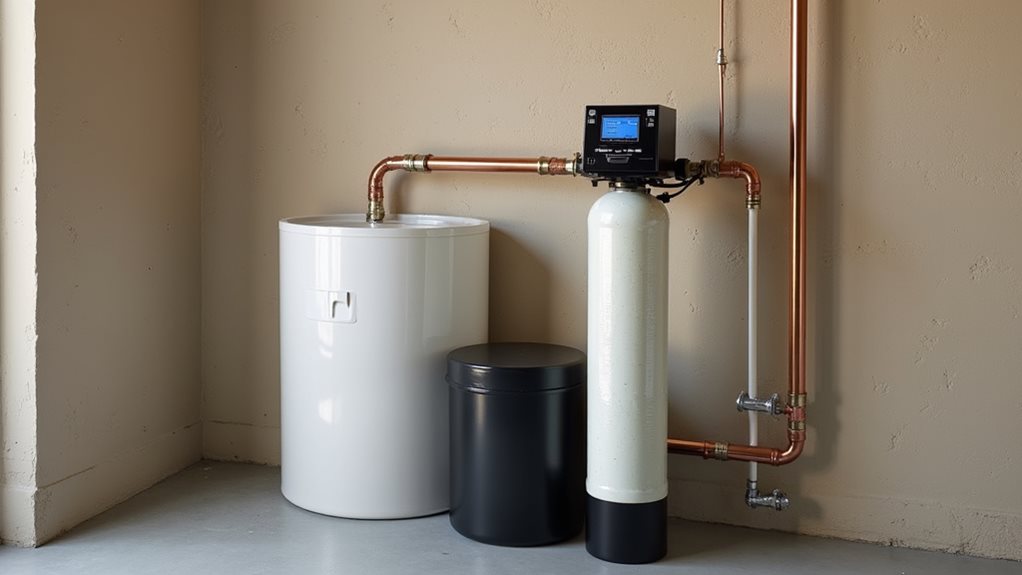
When choosing a water softener for your home, you’ll find several distinct types available at varying price points to match different needs and budgets.
Ion exchange systems, the most common option, range from $400 to $3,000, while salt-free alternatives using potassium cost between $500 and $4,000.
For thorough filtration, reverse osmosis systems run from $1,000 to $11,000, and magnetic systems offer an economical choice at $200 to $600. Additionally, it’s important to consider optimal curing conditions when installing any plumbing systems to avoid potential damage to newly poured concrete.
Breaking Down Installation Expenses
Three major components make up your total water softener installation costs: labor, materials, and potential modifications to your existing plumbing system.
You’ll typically spend between $1,000 and $3,000 for a complete installation, though costs can range from $500 to $6,000 depending on your location, home size, and system complexity.
Professional labor typically runs $150 to $900 for basic installations. It is also important to consider the age and condition of your plumbing system, as these factors can influence installation and maintenance costs.
Monthly and Annual Maintenance Costs
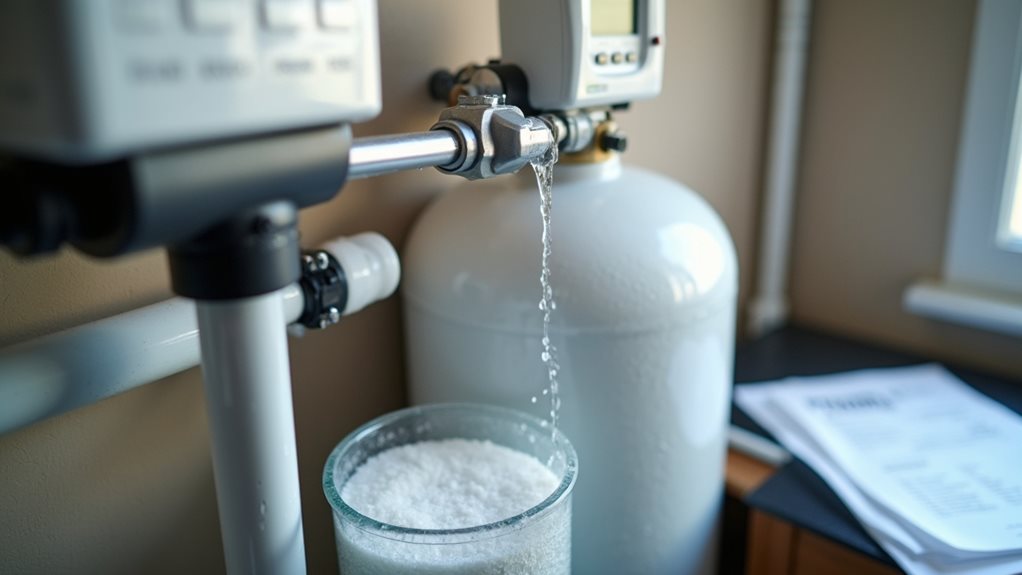
You’ll need to factor in routine salt replacement costs of $5-15 monthly for traditional water softeners, though potassium-based systems run higher.
The annual professional service visit, which typically includes a thorough system inspection and cleaning, will set you back between $100-200.
While basic monthly maintenance tasks like checking salt levels can be handled independently, it’s essential to budget for both these recurring expenses to keep your system running efficiently.
Routine Salt Replacement Expenses
Regular salt replacement ranks among the most predictable ongoing expenses for water softener owners, typically ranging from $5 to $15 per month depending on household water usage and system efficiency.
You’ll find that a 40-pound bag of salt costs between $5 and $25, with purer varieties commanding higher prices.
Your annual expenses can reach $50 to $300, particularly if you’re using premium salt or potassium chloride alternatives.
Annual Service Visit Costs
When planning for water softener maintenance, you’ll need to budget for both monthly upkeep and professional service visits that typically range from $100 to $200 annually.
These regular inspections help extend your system’s lifespan and prevent costly repairs.
You’ll also face monthly expenses like pre-filter replacements ($10-$30) and operational costs, including electricity and water usage fees, averaging $50-$100 per year.
Choosing the Right System Size for Your Home
The process of selecting the right water softener size requires careful consideration of several key household factors that directly impact system performance.
You’ll need to calculate your daily water usage based on household members (80-100 gallons per person), measure your water’s hardness level in GPG, and determine your peak flow requirements.
These factors will help you choose between common grain capacities ranging from 16,000 to 110,000.
Professional vs. DIY Installation: Cost Comparison
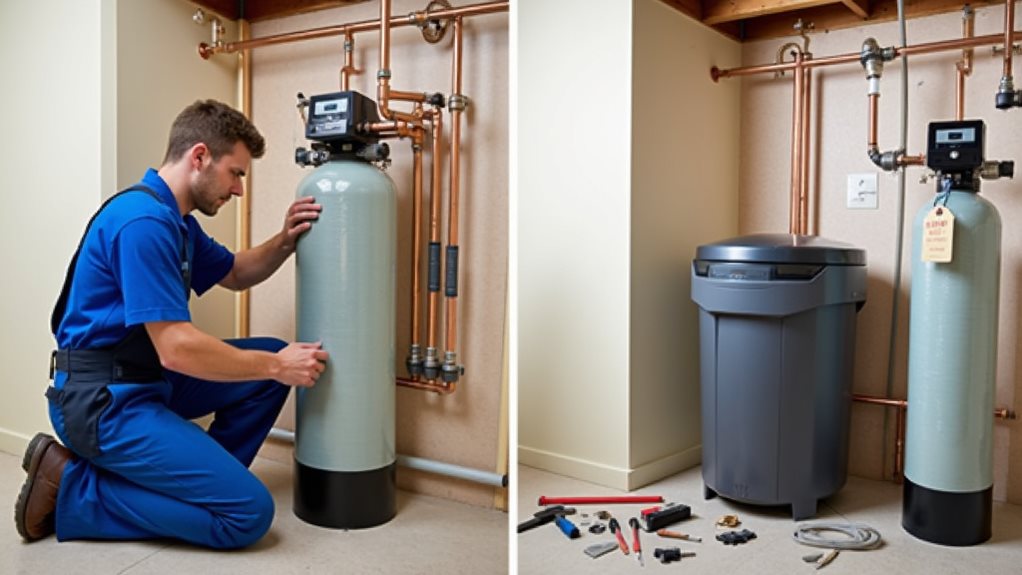
Making an informed decision between professional and DIY water softener installation requires careful consideration of both upfront costs and long-term implications.
While you’ll save $150 to $1,000 in labor costs with DIY installation, professional installation typically ranges from $1,109 to $1,373 and includes warranties that protect your investment.
Consider your plumbing knowledge, as incorrect DIY installation can lead to costly repairs and voided warranties.
Return on Investment: Long-Term Savings
Beyond installation decisions, understanding a water softener’s return on investment helps justify its upfront costs.
You’ll typically see returns within 3-5 years through reduced energy bills, extended appliance lifespans, and lower cleaning product expenses.
Health and Lifestyle Benefits of Soft Water
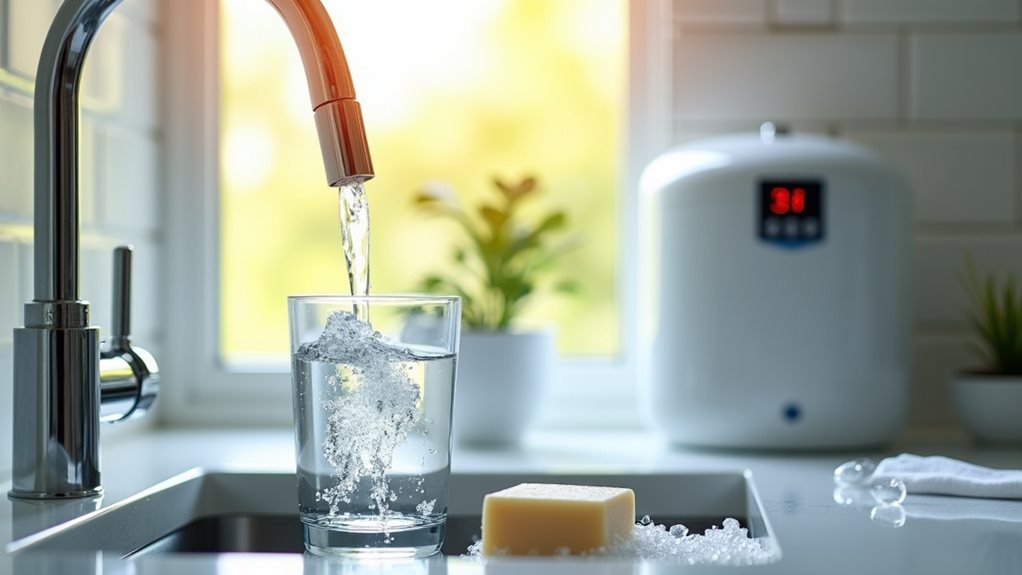
When considering the impact of soft water on daily life, you’ll uncover numerous health and lifestyle advantages that extend far beyond basic utility savings.
You’ll experience softer skin, shinier hair, and reduced risk of conditions like eczema.
Your cleaning routines will become more efficient, as you’ll need less soap and detergent, while your clothes and dishes will emerge cleaner and brighter.
Environmental Considerations and Operating Costs
Although water softeners offer numerous household benefits, they come with significant environmental implications and ongoing operational costs that you’ll need to take into account.
The salt discharge from these systems can harm aquatic ecosystems and affect water quality, while annual maintenance costs typically range from $50 to $300, plus operational expenses for electricity and water during regeneration cycles.
Protecting Your Appliances With Soft Water
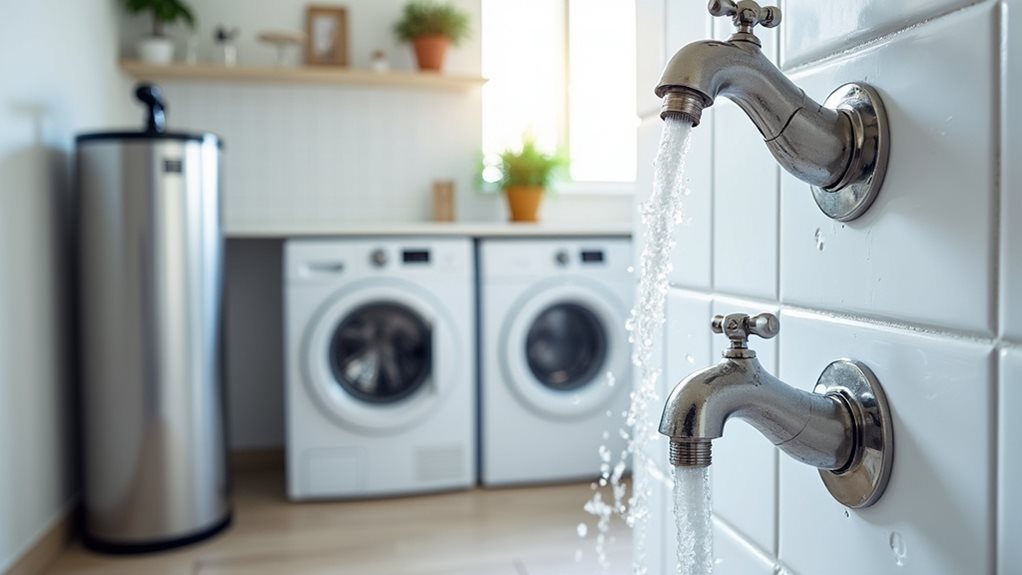
Investing in a water softener can greatly extend the life and efficiency of your household appliances by preventing destructive mineral buildup.
When you use soft water, your appliances will consume less energy, require fewer repairs, and maintain better performance over time.
You’ll also save money on detergents and cleaning products, while your washing machine and dishwasher will operate more effectively.
Water Testing and System Selection Guide
To protect your home and family, you’ll need to start with professional water testing to identify specific contaminants and determine your water’s hardness level.
Understanding your test results will help you make an informed decision about the type and size of water softener that’s right for your household, considering factors like daily water usage and existing plumbing configuration.
Your local water treatment professional can guide you through interpreting the test data and selecting a system that matches your needs, whether you’re looking for a basic softener or an extensive filtration solution.
Testing Methods and Equipment
When selecting a water softening system, you’ll need to conduct thorough water testing to determine your specific treatment requirements.
You can employ bacterial test kits, colorimeters, and multiparameter meters to measure essential factors like pH levels, total dissolved solids, and water hardness.
Modern testing equipment offers efficient methods, including colorimetry and titrimetry, to accurately assess your water’s composition and help you choose the right system.
Interpreting Water Hardness Results
Understanding how to interpret your water hardness test results can make a significant difference in choosing the right water softening system for your home.
Results are measured in parts per million (ppm) or milligrams per liter (mg/L) of calcium carbonate, with readings below 60 considered soft, 60-120 moderately hard, 120-180 hard, and above 180 very hard.
Choosing Your Ideal System
Selecting the right water softener demands careful consideration of your household’s specific needs and water conditions.
You’ll need to evaluate your water hardness levels through testing and determine your daily usage patterns.
Consider whether a salt-based system, which requires regular maintenance but offers superior softening, or a salt-free alternative, which is more eco-friendly but less effective, better suits your requirements.
Essential Maintenance Tips and Schedules
To maintain your water softener’s ideal performance, you’ll need to follow several essential maintenance procedures throughout the year.
Check your salt levels regularly, clean the brine tank annually, and inspect for salt bridges by pushing on the salt with a broom handle.
You’ll also want to flush the resin bed every few months and clean the venturi valve twice yearly to prevent clogging.
Final Note
Installing a water softener is a significant investment that’ll typically pay for itself through extended appliance life, reduced energy costs, and lower maintenance expenses. When you’re ready to purchase, consider getting multiple quotes, have your water professionally tested, and choose a system that matches your household’s specific needs. With proper maintenance and regular monitoring, you’ll enjoy the benefits of soft water while protecting your home’s plumbing system for years to come.